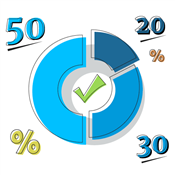Financial Wellness Calculator
Ad Disclosure: This article contains references to products from our partners. We may receive compensation if you apply or shop through links in our content. This compensation may impact how and where products appear on this site. You help support CreditDonkey by using our links.
Are your finances in good shape? Use this financial wellness calculator to see how you measure in 5 key indicators of financial health.
 |
Worried your finances aren't where they should be?
You're not alone.
Luckily, there are some handy guidelines you can follow to get your finances in shape. Use the financial wellness calculator below to see how you stack up in:
- Emergency funds
- Debt-to-income ratio
- Retirement savings
- Insurance
Then, learn some steps to take to improve your financial wellness, including a financial health checklist, below.
How to use the financial wellness calculator
To calculate your financial wellness, follow the steps below:
- First, enter your current age.
- Then, add your annual gross income.
- Enter your total debt, such as any credit cards or loans.
- Next, add how much you currently have saved up.
- Then, specify the percentage of your gross income that you set aside for savings each year/month.
- If you have one, enter the coverage amount for your life insurance policy.
- Then, add the current rate of inflation. (You can check a source like this to find the current inflation rate.)
- Finally, add the ROI you're earning on your savings.
Then, hit "Calculate." The calculator will show you how close you are to hitting some important measures of financial wellness, including your debt-to-income ratio, emergency fund, and more.
Check out the rules-of-thumb below to see what your financial wellness scores are based on.
- Western Alliance Bank:
High-Yield CD Rates - Up to 4.30% APY - Consumers Credit Union:
12-Month High-Yield CD - 4.00% APY - SkyOne Federal Credit Union:
12-Month No-Penalty CD - 3.90% APY - CIT Bank Term CDs:
Up to 3.50% APY - American First Credit Union:
12-Month High-Yield CD - 4.00% APY - Technology Credit Union:
5-Month No Penalty CD - 4.00% APY - Freedom Bank:
12-Month No-Penalty CD - 3.75% APY - Blue Federal Credit Union:
15-Month High-Yield CD - 3.55% APY - Quontic:
CD Rates - Up to 3.75% APY - Discover Bank:
1 Year CD - 4.00% APY
How do you calculate financial wellness?
The calculator in this article measures your financial wellness based on the following goals:
Emergency Fund = 6x your monthly income
If your current emergency fund is equal to or greater than 6 times your monthly income, your score will be at 100%. The closer you are to 100, the better.
Debt to Income Ratio = As close to 0 as possible
The lower your debt-to-income ratio, the higher your score will be. A DTI ratio of 1 will result in a 0% score, while a DTI of 0 will result in a 100%.
Retirement = Current savings greater than or equal to target saving rate
The closer your current savings is to your target saving rate, the higher your score. If your savings is greater than or equal to your target saving rate, you'll score 100%.
Insurance = 10x your annual income
If your current life insurance coverage is greater than or equal to 10x your annual income, your score will be 100%. The less you have saved, the lower your score.
If you can hit all the goals below, you're in pretty good shape. But there's always more you can do, especially if you have ambitious goals like retiring early. Find some tips for improving your financial health below.
- NexBank:
High-Yield Savings Account - 4.35% APY - CIT Bank Platinum Savings:
$300 Bonus - Discover® Online Savings:
$200 Cash Bonus - Western Alliance Bank:
High Yield Savings Account - 4.25% APY - UFB Portfolio Savings:
Earn up to 4.01% APY - Mission Valley Bank:
High Yield Savings Account - 4.27% APY - First Community Bank:
High-Yield Savings Account - 4.26% APY - DR Bank:
High-Yield Savings Account - 4.25% APY - Paprika Capital Bank:
High-Yield Savings Account - 4.22% APY - Dayspring Bank:
High-Yield Savings Account - 4.17% APY
How to improve your financial health
- Create a budget that works for you.
There's no single budgeting rule that will work for everyone, so it's best to look at a few. Start with the 50/30/20 budget or zero-based budgeting and explore from there. - Automate your savings.
If you struggle to hit your target savings rate, consider automating your savings. All you need to do is choose an automatic saving app and set up your savings preferences. After a while, you'll have a good chunk of change stashed away.This includes stashing away money in an emergency fund. Find out how much your emergency fund should be with our handy calculator. - Invest wisely.
If you want to retire, you'll need to invest and save. To find the right investments for you, consider your risk tolerance, age, goals and experience level. Beginners could try a robo-advisor, while hands-on investors could try working with a self-managed app. - Put protections in place.
As mentioned above, it's important to have an emergency fund in place. But if you have a family, any loved ones, or a business that depends on you, consider getting a life insurance policy. These days, you can even apply online and get covered in minutes.
Financial health checklist
There's no one-size-fits-all approach to finance, but there are a handful of things you'll want to take care of to be in good shape. Consider this financial health checklist below to see how you stack up:
- Your debt is either paid off or paid down so it's manageable.
- You have an emergency fund in place (at least 3x your monthly expenses).
- You make some effort to track or review your spending each month.
- You try not to spend more than 30% of your monthly income on "wants."
- You have some sort of retirement savings in place.
- You're contributing to your retirement every month (or as often as you can).
- You have some sort of budget in place that you stick to.
Imagine Living Life Without Debt
- Get a free savings estimate today
- See how quickly you can be debt free
- No upfront fees and no obligation
What Is the 50/30/20 Rule?
Many people hoping to improve their financial health look to techniques like the 50/30/20 budgeting rule to get their finances on track.
The 50/30/20 Rule is a budgeting plan introduced by Senator Elizabeth Warren. In this budgeting rule, your monthly after-tax income is split into the below categories:
- 50% is spent on "needs"
- 30% is spent on "wants"
- 20% is set aside for savings
The 50/30/20 rule is popular because it's simple, easy to remember, and easy to stick to.
Keep in mind, this is only a rule of thumb. It's okay if those percentages spill over a bit. The main goal is to get you to set aside a healthy amount for savings and to avoid overspending on wants.
Bottom Line
It's key to remember that "financial wellness" looks different for everyone. Some people may have more debt, some people may have fewer savings - all of that is perfectly okay.
If you try to make small, incremental steps toward financial wellness, you'll be in much better shape in 1, 5, and even 40 years. Start taking these steps as soon as possible, and before long, you'll be buying a home, retiring, or going on a nice long vacation that you earned.
Note: This website is made possible through financial relationships with some of the products and services mentioned on this site. We may receive compensation if you shop through links in our content. You do not have to use our links, but you help support CreditDonkey if you do.
|
|
|










